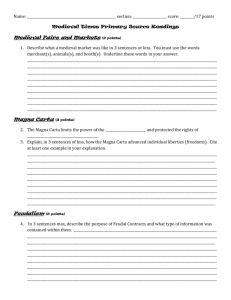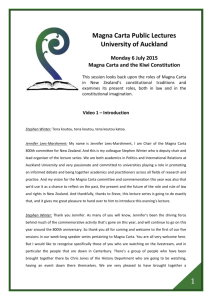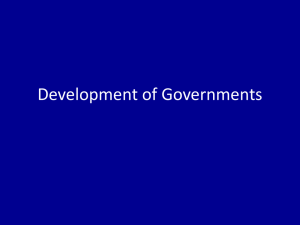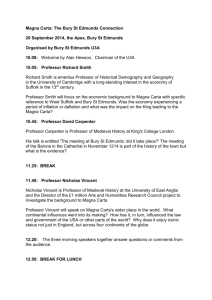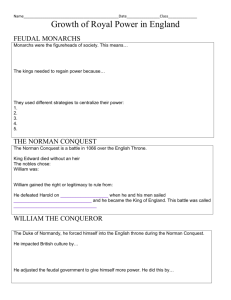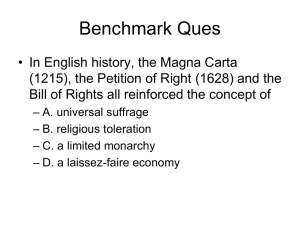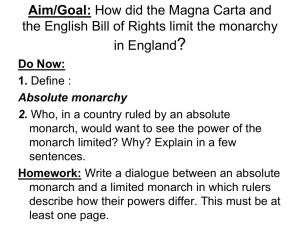click here to view the transcript for this video
advertisement
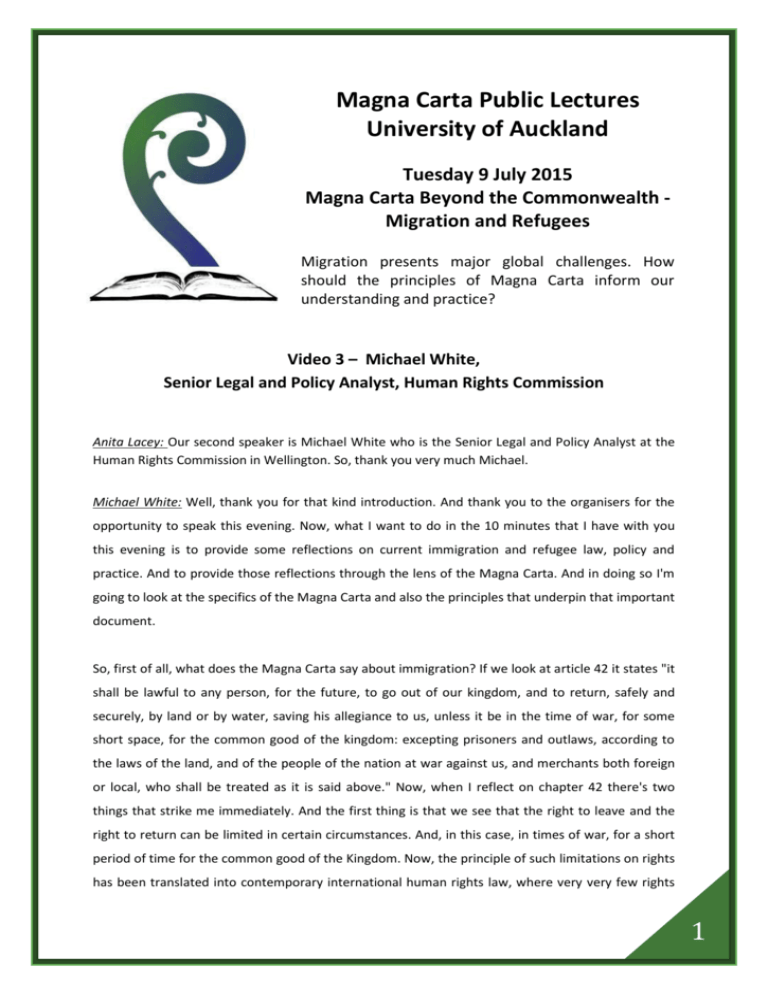
Magna Carta Public Lectures University of Auckland Tuesday 9 July 2015 Magna Carta Beyond the Commonwealth Migration and Refugees Migration presents major global challenges. How should the principles of Magna Carta inform our understanding and practice? Video 3 – Michael White, Senior Legal and Policy Analyst, Human Rights Commission Anita Lacey: Our second speaker is Michael White who is the Senior Legal and Policy Analyst at the Human Rights Commission in Wellington. So, thank you very much Michael. Michael White: Well, thank you for that kind introduction. And thank you to the organisers for the opportunity to speak this evening. Now, what I want to do in the 10 minutes that I have with you this evening is to provide some reflections on current immigration and refugee law, policy and practice. And to provide those reflections through the lens of the Magna Carta. And in doing so I'm going to look at the specifics of the Magna Carta and also the principles that underpin that important document. So, first of all, what does the Magna Carta say about immigration? If we look at article 42 it states "it shall be lawful to any person, for the future, to go out of our kingdom, and to return, safely and securely, by land or by water, saving his allegiance to us, unless it be in the time of war, for some short space, for the common good of the kingdom: excepting prisoners and outlaws, according to the laws of the land, and of the people of the nation at war against us, and merchants both foreign or local, who shall be treated as it is said above." Now, when I reflect on chapter 42 there's two things that strike me immediately. And the first thing is that we see that the right to leave and the right to return can be limited in certain circumstances. And, in this case, in times of war, for a short period of time for the common good of the Kingdom. Now, the principle of such limitations on rights has been translated into contemporary international human rights law, where very very few rights 1 are absolute. And most can be restricted in certain circumstances. The restrictions in contemporary human rights law are broader than just in times of war. But the test is more nuanced. And a careful balancing act is required. As a general principle, ‘permissible limitations and restrictions must constitute an exception to the rule and must be kept to the minimum necessary to pursue the legitimate aim of safeguarding other human rights.’ ‘Necessary’ means that any proposed restriction is pursuant to that legitimate aim, is proportionate to that legitimate aim and is no more restrictive than is required to achieve that. This test, of course, is being codified in New Zealand's own Bill of Rights Act through section 5. Now the second thing that strikes me when looking at chapter 42 is the scope of the right itself. Chapter 42 refers to leaving and returning. It also extends to both local and foreign merchants. Now, this is in stark contrast to subsequent human rights instruments, whether right to free movement is codified. The Universal Declaration of Human Rights and the International Covenant on Civil and Political Rights. In both cases it has been argued that the right to free movement is an incomplete right because it’s not matched by a state duty of admission – except in those limited cases of asylum and protection. So, how does this play out in current state practice? Well, there’s numerous examples of State’s placing restrictions on peoples’ right to leave. Now, most recently we have seen this play out in New Zealand is through the passage of the Countering Terrorist Fighters Legislation Bill. Now, that Bill amended the Passports Act to allow a minister to refuse to issue a passport on the grounds of national security if he or she believed that the person was a danger to another country and there were no other means of mitigating that danger. In doing so such legislation obviously limits the right to free movement. In that particular case the limit on the right may be justified because it's prescribed by law, it's deemed necessary to protect national security, and it does so in a way which infringes the right as little as possible. Only where there is no other means to mitigate the risk. In other cases the balance may not be so easily reached. For example, it is generally accepted that a state may discriminate in its immigration policy. In other words if a state does not want to admit people from a particular country at a particular time they don't have to. New Zealand follows this approach. In fact, section 392 of the Immigration Act expressly removes the content and scope of immigration regulations and instructions from the ambit of the Human Rights Act. 2 While the principle of sovereignty may justify a state determining who may enter and remain within its borders, it seems to me that such an approach is at odds with the principle of equality in the Magna Carta. And clearly at odds with chapter 42 which guaranteed to foreign merchants the right to come to England, to stay in England, and to go through England. This begs the question remembering that the Magna Carta is a living document – as to whether, in an increasingly globalised world and economy, it is time to reconsider the application of the principles of the Magna Carta to contemporary immigration policy? Now I just want to take a moment to paint a picture for you. People are being held in detention. People are being held in detention indefinitely because they potentially pose a risk to security. These same people are unable to challenge secret evidence against them. These same people are victims of cruel inhuman treatment and, in some cases, torture. And they're unable to seek redress or demand accountability. The people I am speaking about are asylum seekers. Asylum seekers who are fleeing persecution and trying to find safe-haven, and instead find themselves detained indefinitely in many countries around the world. So what would the Magna Carta say about this? Chapter 39, which I'm sure you've heard many times, "to no one denied or delayed the right of justice." Tom Bingham once reflected on chapter 39, saying "even in translation the terms of chapters 39 and 40 have the power to make the blood race. These are words which should be inscribed on the stationery of the Ministry of Justice and the Home Office, in place of the rather vapid slogans which their letters now carry." Thankfully New Zealand has a proud history of only detaining asylum seekers in exceptional cases and then for only for the shortest time possible. However, New Zealand should not be complacent. In 2012 an amendment to the Immigration Act was passed – an amendment often referred to as the Mass Arrivals Bill. This amendment allows for the detention of a group of asylum seekers under a group warrant – on the sole basis that they are part of a “mass arrival group”. While there remain differing views between government and commentators on the legality of these provisions at international law, what is clear is that due process and natural justice rights are engaged. The question will be how these provisions are implemented in practice – if they ever are – and whether this achieves the right balance. Furthermore, the Immigration Act 2009 anticipates a number of situations where decisions may be made based on classified information. In these cases applicants, or appellants as the case may be, have more limited opportunities to view and comment on potentially prejudicial information. This obviously also raises questions of due process. In an attempt to mitigate this the Immigration Act 3 provides for what it calls special advocates to represent the interests of the effected person. This goes a significant way towards mitigating the risk of breach of due process rights. However, concerns have been raised about the statutory restrictions on the communications between the special advocate and the affected person and that the extent of those restrictions render it difficult for special advocates to mitigate the unfairness that is inherent in the non-disclosure of that information. Only time will tell whether the application of the special advocates procedure achieves the right balance. So, as can be seen through these examples, it is clear that the ancient principles of liberty and freedom, founded on the Magna Carta, are relevant to immigration law, policy and practice today. And, in fact in my view - in an increasingly challenging global environment - they have never been more important. Thank you Anita Lacey: Thank you very much Michael. 4


